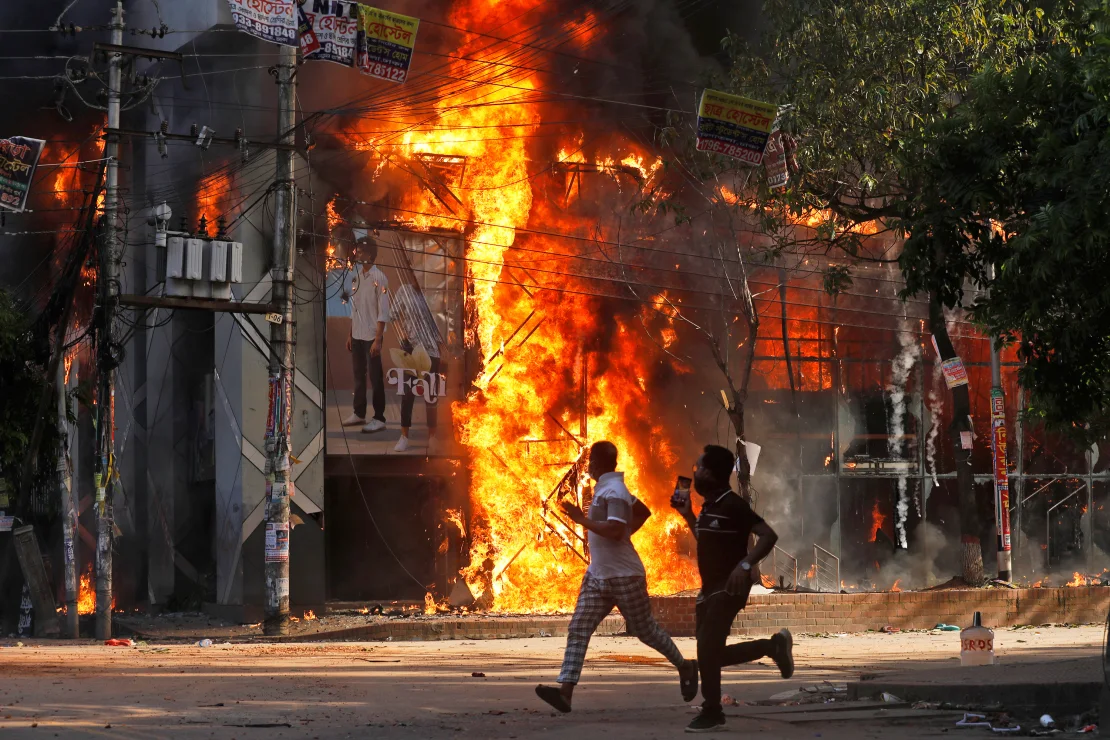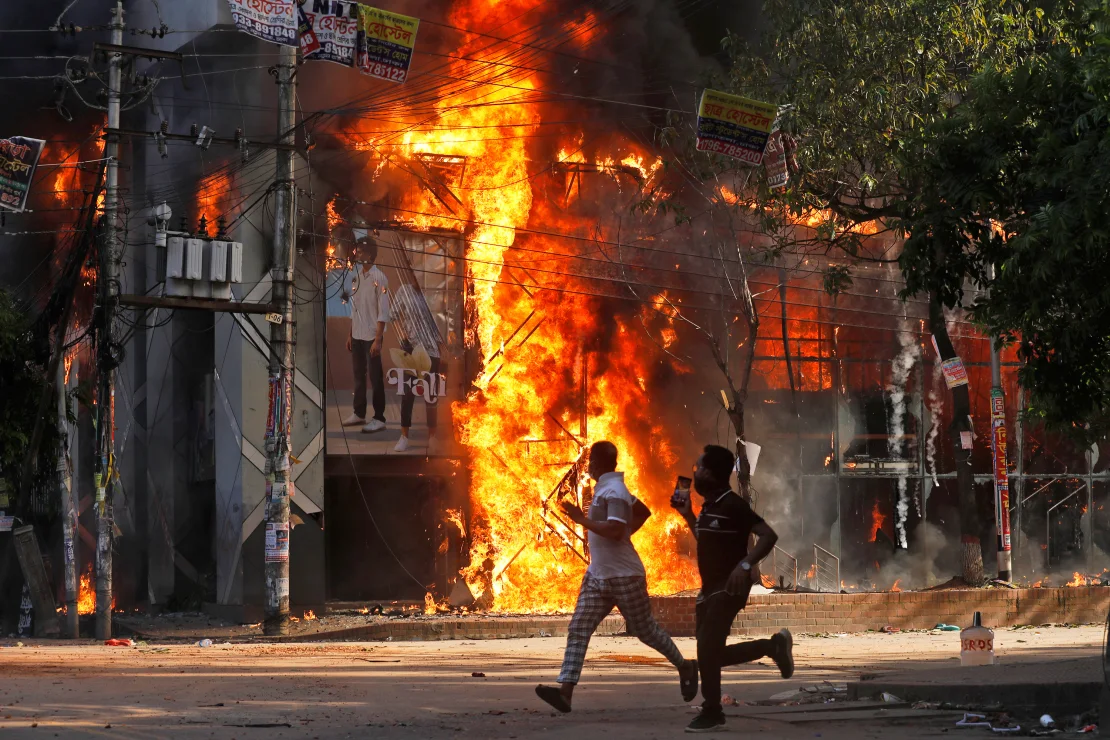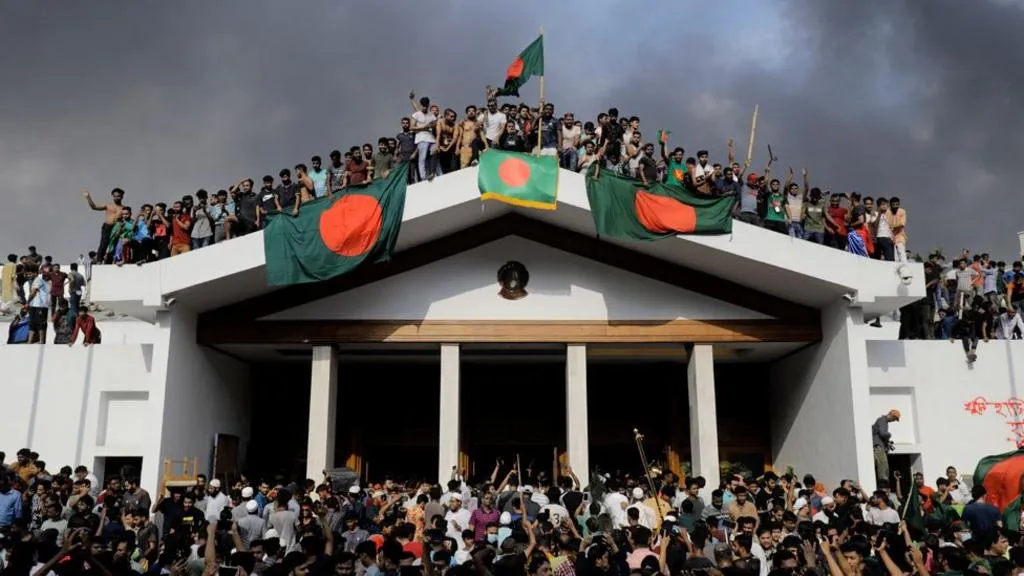
Bangladesh Prime Minister Flees to India Amid Anti-Government Unrest
Dhaka, Bangladesh — On Monday, Sheikh Hasina, the Prime Minister of Bangladesh, resigned and fled to neighboring India following a dramatic escalation in anti-government protests. Demonstrators stormed her official residence after weeks of violent clashes demanding her resignation and significant policy changes.

Protests and Resignation
The unrest began over issues related to government job quotas and allegations of discrimination. Protesters, many of whom were young students, celebrated Hasina’s departure by climbing on military tanks and defacing a statue of her father, Sheikh Mujibur Rahman, in Dhaka. The scenes of jubilation were marred by violence as protesters attacked Hasina’s residence, setting vehicles on fire, and looting the building.
Military Intervention
General Waker-uz-Zaman, Bangladesh’s army chief, confirmed Hasina’s resignation and announced that the military would establish an interim government. In a national address, he urged protesters to avoid violence and promised that both the military and police would exercise restraint.
Casualties and Violence
Sunday’s clashes resulted in at least 91 deaths, including 13 police officers, marking the deadliest day of protests in Bangladesh’s recent history. The previous record was 67 deaths reported on July 19. The violence also led to numerous injuries, including at least 32 children killed last month, according to UNICEF.
The government responded by imposing an indefinite curfew and accused of using excessive force against demonstrators—a claim they denied. The unrest spread to major cities such as Rajshahi, Barisal, and Chittagong, leading to heightened tensions across the nation.
International Reactions
In response to the crisis, the US State Department and UN Secretary-General António Guterres have called for restraint and a peaceful transition of power. Guterres emphasized the need for a transparent investigation into the violence, while the US Embassy advised American citizens to seek safety and consider returning home due to the volatile situation.
Political Developments
Bangladesh President Mohammed Shahabuddin announced the release of opposition leader Khaleda Zia, a longtime rival of Hasina. Shahabuddin also stated that the current parliament would be dissolved, and an interim government would be formed in consultation with all political parties.
Student Leaders’ Demands
Student leaders, including Nafiz Basher from Students Against Discrimination, are calling for the abolition of discriminatory systems and the appointment of Nobel Laureate Muhammad Yunus as interim leader. Yunus has expressed a desire for a civilian government to take over from the military.

Current Situation
As the situation evolves, there are concerns about the future stability of Bangladesh. While some celebrate Hasina’s departure, others worry about the potential for further violence and the protection of minority rights. The ongoing protests and political instability reflect deep-seated issues within the country that will need to be addressed to ensure a peaceful resolution.
Police Actions
Reports indicate that police and military forces have used aggressive tactics, including live ammunition and tear gas, against protesters. The response has included brutality and a communications blackout, complicating efforts to verify the extent of the violence.
Conclusion
The resignation of Sheikh Hasina and the ensuing chaos highlight significant challenges for Bangladesh. As the nation navigates this period of upheaval, the calls for justice, democratic reforms, and protection of minority rights will play a crucial role in shaping the country’s future.



